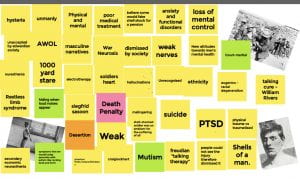By Sophie Moennich (University of Roehampton)
Now over a year since the first lockdown, many history students have adapted to the challenges of online learning. But levels of engagement with online learning has seen wide variation, especially as time has gone on. Some lecturers have used new approaches to help history students stay engaged, something increasingly helpful as time has gone past. Jamboard, breakout rooms and other approaches have helped for history students to share their ideas and stay engaged.
When I asked other history students about their experiences, a common reply was that pre-recorded lectures have been really useful. One student commented that they ‘engaged even better than in person as there was no distraction and I could re-watch and make proper notes’. Pre-recorded lectures have allowed students a sense of control over their time, and responsibility to ensure that they have watched them before the seminar. They are even more important for international students who may be in a different time zone. Because lectures are more accessible, students are more able to engage throughout the seminar, and have a stronger understanding of the topic. Another student confirmed that ‘lecturers make sure everything is electronically available, so I have access to more than last year, especially e-books.’ This implies that for many history students, learning resources have been largely unaffected by online leaning.

Breakout rooms and websites such as Jamboard have stood out to me as one of the most important developments. Breakout rooms have allowed students to share their ideas, and establish a sense of involvement for students who may prefer to share their ideas with a smaller group of people. This has helped students with different confidence levels, and also ensured that they stay engaged with their course. Additionally, Jamboard has allowed students to share their ideas on a virtual post-it note seen by everyone else in the seminar. This has been especially useful as it has allowed students to share their ideas anonymously and more extensively with other students’ ideas. This suggests that the transition to online learning has helped students who are less confident in sharing their ideas to feel more secure in doing so, even if anonymously.
On a personal and social level, one student I spoke to additionally revealed how online groupwork was also useful in offering a space to discuss how they were adapting to online learning, and to share ideas. With group presentations still occurring within my own course, students have been able to stay in contact and discuss module work together.
It is the sense of control over learning that I would like to emphasise going forward. It is so important to empower students when they watch lectures, and give them the space to share their ideas in an environment they feel comfortable with. This independence in relation to time management and preparation for seminars is especially important when so many may feel their motivation dwindling as a result of lockdown.
We’d like to thank Sophie for sharing the results of her research into how the pandemic has affected History students and would love to hear more from academics and their students, either on this blog or via Twitter @history_uk – get in touch if you’d like to have your say.
We’re currently collecting feedback on the Pandemic Pedagogy Handbook and would encourage you to fill in the survey here.
In addition, we’ll soon be announcing a follow-up project on pedagogy after the pandemic. So watch this space!
You must be logged in to post a comment.